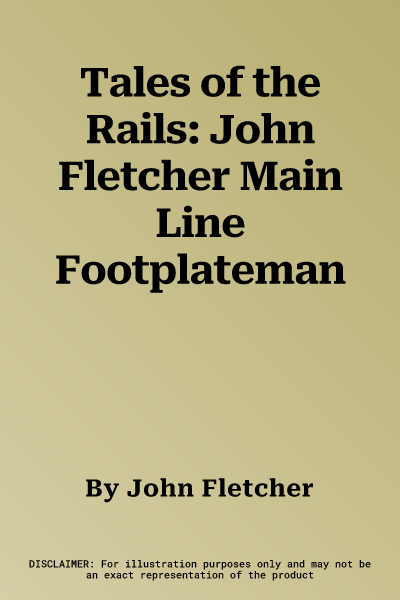John Fletcher
(Author)Tales of the Rails: John Fletcher Main Line FootplatemanPaperback, 24 August 2019


Description
I must admit to not having had a lifelong love of railways I certainly wasn't interested in them in my early days, I would have been at least eighteen months old before getting hooked, after being presented with a plastic steam engine rattle by my mother which she tied to the side of my Silver Cross pram giving me an early opportunity to noisily announce an affection for my new found interest, and I have been rattling on about them ever since! My childhood was one of happiness in our small terraced house in 1950's Preston, and looking back on those days I feel fortunate to have been brought up in that generation where people had little of monetary value but a mixture of discipline, love, and respect did exist in most working class households. The great outdoors gave us freedom to play and pursue a variety of interests and influenced by my Uncle, Bob Fletcher who drove steam locomotives for a living I became an avid trainspotter and from then on my life's ambition was to follow in his footsteps and work on the footplate. In February 1962 my five years of dreaming became reality when I began my railway career at 24C Lostock Hall on the bottom rung of the ladder as an engine cleaner with clock number 287.It was a case of being in the right place at the right time as in some areas of the country steam had been superseded but not here in the north were steam still ruled supreme and I was going to be part of it! We were the last generation of BR steam footplate men and during those six and a half years it was steam all the way for most of the time, which saw me accumulate over 1,500 footplate turns and graduate to become one of the senior firemen.Such was my enthusiasm for the job, the only thing I looked forward to after finishing work for the day was going back again the day after! Unlike the age of steam, computers can never create characters the job has changed so much over the years, fortunately for me the railways of my generation seemed to attract a whole host of varying personalities to perform the now many obsolete manual jobs then in existence. With name changes to protect the innocent, or guilty, some of these men feature prominently in this book. Leaving the railways at the end of steam before returning after a brief interlude for another five year spell but having no real love of the diesel locomotive, my opinion being that a complete layman could generate the same power from the machine as any experienced driver could, the electric locomotive had even less appeal particularly when electrification of the West Coast main line was completed in 1974 the 'chicken mesh' obliterating those beautiful Westmoreland Fells. I decided that my time on the railways was finally up. Running our family business ate up all my time for a number of years before discovering the world of preserved railways in the early eighties firstly at the fledgling West Somerset Railway followed shortly after by our discovery of the North Yorkshire Moors Railway becoming a driver there in 1985. This was followed in 1998 by a return to operating steam on the main line spending fifteen years as a fireman with both West Coast Railways and Merlin Rail during which time I fired almost every main line registered steam locomotive over the length and breadth of the country. This would have been impossible to achieve working for BR in the steam era and I personaly doubt if anyone would be able to cover these journeys again due to the ever increasing restrictions imposed on the routes available to the steam locomotive. Looking back I suppose that I have had three railway careers firstly with British Railways, followed by Preserved Railways, then West Coast and Merlin Rail during which time I calculate to have fired over sixty different classes of steam locomotive. My long career on the footplate is now over due to health reasons and I have been withdrawn from traffic but have not yet gone for scrapping! I do hope that you enjoy reading these memoirs as much as I have in writing them and reliving many of the journeys again, please forgive any mistakes or errors that may have crept in bearing in mind that some of these events took place over half a century ago.